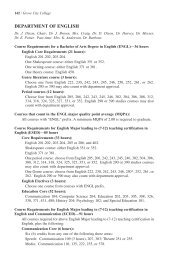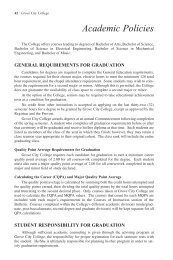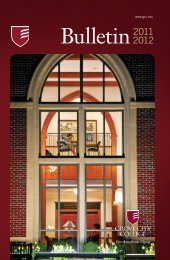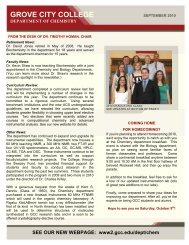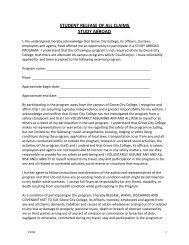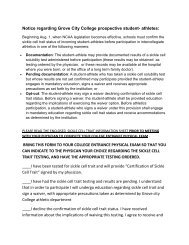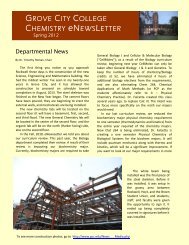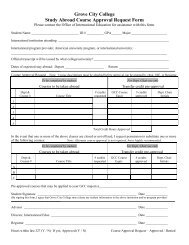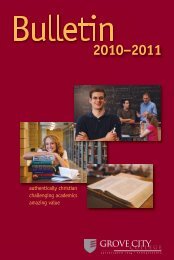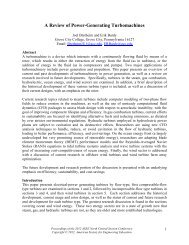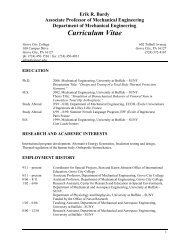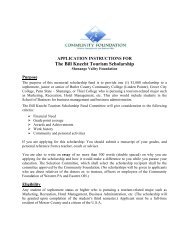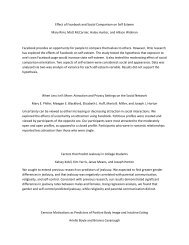2009–2010 - Grove City College
2009–2010 - Grove City College
2009–2010 - Grove City College
Create successful ePaper yourself
Turn your PDF publications into a flip-book with our unique Google optimized e-Paper software.
Mathematics / 145<br />
Professional Education Requirements (41 hours):<br />
Education 103, 201, 202, 203, 303, 305, 306, 371, 431, and 488.<br />
Computer Science 204.<br />
Note: Credits in Mathematics 111, 117, 141, 151, 152, 161, 231, 237, 305, 306, and 307 do<br />
not apply toward the thirty-five credit hours required for the Mathematics Secondary<br />
Education major.<br />
Courses that count in the major quality point average:<br />
All courses with “MATH” prefix, with the exception of Mathematics 111, 117, 141,<br />
151, 152, 231, 237, and 240. Mathematics Secondary Education majors must have a minimum<br />
MQPA of 2.75 in all Mathematics courses excluding Mathematics 111, 117, 141, 151,<br />
152, 231, and 237.<br />
To be successful in post-graduate pursuits, mathematics majors must have the ability to<br />
locate, evaluate and use information, possess some basic technical literacy, and display<br />
excellent speaking and writing skills. With this in mind, Math 488, Seminar in<br />
Mathematics, is designed to give students Writing Intensive (WI) and Speaking Intensive<br />
(SI) instruction; and to gain experience in processing Information Literacy (IL) knowledge.<br />
Students will gain this experience with a sophisticated computer algebra system in the calculus<br />
sequence (Math 161, 162, 261) and a working knowledge of a computer language in<br />
Computer 141.<br />
Course Requirements for a minor in Mathematics (22 hours):<br />
A minor in Mathematics will consist of 22 hours including Mathematics 210 or 213 and<br />
222 but excluding Mathematics 111, 117, 151, 152, 231, 237, 240, 305, and 306.<br />
Students interested in graduate school in mathematics are advised to take Mathematics<br />
365, 422, and 466 in addition to the above requirements.<br />
Students who are enrolled in Math 141, Math 161, Math 162, or Math 261 and find that<br />
their background is inappropriate for the course may change to another course on or before<br />
the sixteenth class meeting. Those in Math 261 may change to Math 162 or 161; those in<br />
Math 162 may change to Math 161; and those in Math 161 or Math 141 may switch to Math<br />
111. The student must have the approval of the current instructor and the instructor of the<br />
course in which the student intends to enroll. The student must complete and return an<br />
Add/Drop Form to the Registrar’s Office.<br />
Students are expected to contact their advisors for a detailed schedule of courses recommended<br />
to meet requirements for a major.<br />
The normal sequence for students to follow includes the following: Mathematics 162<br />
in the freshman year; 210, 222, and 261 in the sophomore year; 421 and 465 in the junior<br />
year; and 488 in the senior year.<br />
<strong>College</strong> Math Courses Taken in High School<br />
Transfer credit may be awarded for mathematics courses that are equivalent or comparable<br />
to those offered by the <strong>Grove</strong> <strong>City</strong> <strong>College</strong> Department of Mathematics and completed<br />
with a grade of “C” or better. Any such courses taken before entering <strong>Grove</strong> <strong>City</strong> <strong>College</strong><br />
must be listed in the catalog of the college of transfer as courses offered for degree credit to<br />
that college’s undergraduates, must be taken in a classroom setting where most of the students<br />
are college undergraduates, and must be organized and taught by college faculty.



